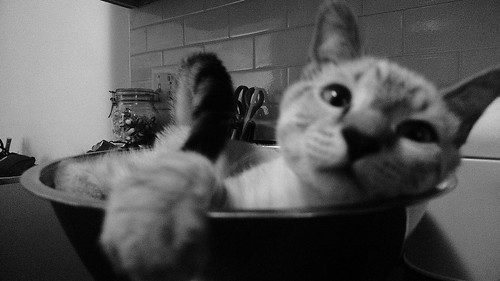02.18.11THUNDERTOME: ROUND 34SURVIVOR: rabbit at rest (john updike)*
CHALLENGER: lit (mary karr)
i'm new to the one-two-three punch of mary karr's trio of memoirs (
the liars' club,
cherry, and
lit), but i knew from the beginning that i'd prefer her to elizabeth
eat, pray, love gilbert;** i knew karr's story would eventually involve david foster wallace, for one thing, and for another i was completely unable to imagine what her
gelato-eating face looks like. karr also did a fairly decent job of convincing me that her motivation was at least as kapow- as it is cha-ching-based (liz gilbert, i'm looking at you again):
"I threw this book away twice," Karr says. "I walked around in my bathrobe for three days and made obscene gestures at the rafters. And there are a couple people I call at such times, sort of the way the president would push the red button. I'd call these people. So I called Don DeLillo, and DeLillo sends me a postcard that says 'write or die.' " Karr's reply speaks volumes about her thick-skinned perspective and dark humor. "I think I sent him one back that said 'write and die.' "
setting aside the fact that no one should write to don delillo, karr sold me on the idea that she decided she needed to tell us about becoming a drunk, a wife, a mother, a writer, a teetotaler, and a catholic, not necessarily in that order.
here's where that gets problematic, and i apologize in advance (this once) for a major excerpt. in an introduction to a published version of his
screenplay for
an education, nick hornby had some terribly interesting things to say about adapting
lynn barber's
memoir:
[B]y its very nature, memoir presents a challenge, consisting as it does of an adult mustering all the wisdom he or she can manage to look back at an earlier time in life. Almost all of us become wiser as we get older, so we can see pattern and meaning that we would not have been able to see at the time. Memoirists know it all, but the people they are writing about know next to nothing.
We become other things, too, as well as wise: more articulate, more cynical, less naive, more or less forgiving, depending on how things have turned out for us. The Lynn Barber who wrote the memoir - a celebrated journalist, known for her perspicacious, funny, occasionally devastating profiles of celebrities - shouldn't be audible in the voice of the central character in our film, not least because, as Lynn says in her essay, it was the very experiences that she was describing that formed the woman we know. In other words, there was no 'Lynn Barber' until she had received the eponymous education. Oh, this sounds obvious to the point of banality: a sixteen-year-old girl should sound different from her sixty-year-old self. What is less obvious, perhaps, is the way the sixty-year-old self seeps into every brush-stroke of the self-portrait in a memoir. Sometimes even the dialogue that Lynn provided for her younger version - perfectly plausible on the page - sounded too hard-bitten, when I thought about a living, breathing young actress saying the words.
somehow, karr hops back and forth between Wastrel Mary and Memoirist Mary in a way that makes both of those selves less knowable and less interesting. the first chapter, in which she has the shit scared out of her (and the her scared out of california) while hitchhiking along the beach at 17, gave me a sense of how good her other memoirs must be; too many of the other chapters are cutesy peek-a-boo games ("[m]y thesis advisor, louise [
glück], baked ornate pastries at home, then sold them in local shops or restaurants") about writing programs and famous friends (if you're hanging out with, say,
tobias wolff, just say you're hanging out with tobias wolff***). calling her ex-husband (the poet michael milburn, who agreed to a pseudonym in lieu of vetting karr's manuscript) "warren whitbread" auto-caricatures him (so much for a nuanced portrait of that marriage), mentioning that she, robert lowell, and anne sexton had been institutionalized at the same hospital trivializes...everyone, i think, and karr more or less loses my sympathy long before her moment of clarity and conversion to catholicism. which sucks, because sprinkled in with her didi-and-gogo, "don't question me! don't speak with me! stay with me!" show and tell are some really marvelous descriptions. her account of flying home to texas for her father's funeral, the horrible, hollow-stomached relief you feel when a long-suffering loved one finally dies, is wonderful. her much-anticipated (by me, anyway) run-ins with a puppyish david foster wallace, moreover, are just the details i want:
[on divvying up stolen cupcake frosting after an alcoholics anonymous meeting for which part of their carpool fell off the wagon]
David? I say, leaning forward.
Yes, ma'am. He turns down the radio.
Any chance you cadged that frosting?
Gross, Gerry says. You're not gonna eat that.
David unzips his backpack, flips off the frosting lid, and hands it back, saying, I feel like I should wipe the edge on my T-shirt. You know, sanitize it.
Taking the can, I dig in and run my finger around the edge, then stick it in my mouth just as Gerry's hand reaches back, hovering for the handoff.
karr's charming when asking her readers to make small emotional investments, but when she gets to
lit's big sell - her sobriety and submission to a higher power after a number of signs - her salesmanship dries up. good - nay,
miraculous - things (jobs, grants, interested agents) happen to her after she prays for them, but we never quite believe she's the slacker she says she is: though she's "unhindered by a high school diploma" and admits that she's "published one slim volume of verses and some essays, but so has every other semiliterate writer in cambridge," her fortune's pretty clearly not falling from the sky. then again, does it matter that i'm not buying her story? as i avoided this review by reading up on karr around the web, i found
the slate interview in which she says she "didn't [write
lit] to help anybody. I did it for the money. I did it because I’m greedy and I like living in New York." oh, that thick-skinned perspective and dark humor! i'm having a hard time feeling something after all.
VICTOR: updike; he's like three mary karrs tall, or was, and would flatten her with a description of septuagenarian golfers while she fumbled for a salty texas epithet.
as lit was the last book i finished in december, that means...rabbit at rest was the best book i read last year, and updike is the first inhabitant of THUNDERTOME valhalla. clear the arena for 2011! (two months late, but shh.)
imaginary reading group discussion questions
01 how would you respond to a WRITE OR DIE postcard from don delillo?
02 if you've read karr, do you buy her modesty?
03 would you share frosting with a casual carpool?
04 if you could get away with referring to a literary light by a nickname in mixed company, to whom would you refer, and what would you call them? dibs on peaches hemingway.
05 if you were spending a week in iceland at the end of march, how many hours would you be willing to spend on an off-season bus to see necropants (defined below****)?
06 would you wear necropants?
*previous battle here.
**full disclosure: i haven't read all of eat, pray, love, though i have read committed. it was okay.
***unless you're a stanford undergrad, in which case you should know that talking about "tobi" makes you look like alex trebek when he pronounces something in spanish.
****"Of all the strange displays at the Museum of Icelandic Sorcery & Witchcraft, perhaps the most bizarre is a plastic replica of the legendary 'necropants' - trousers made from the skin of a dead man's legs and groin. It was commonly believed that the necropants would spontaneously produce money when worn, so long as the donor made an honest verbal agreement that his corpse could be skinned upon his death. Once dead and buried, the donor corpse had to be unearthed at the dead of night, then a magic rune and a coin from a poor widow...were placed in the dead man's scrotum.
The necropants brought incredible wealth to [their] wearer - anytime money was needed, one could reach down into the scrotal area and...voila! There was a catch, however; if you were to die wearing the necropants, your soul would be condemned to roam the earth until the end of time." (lonely planet iceland, 7th ed.)
















